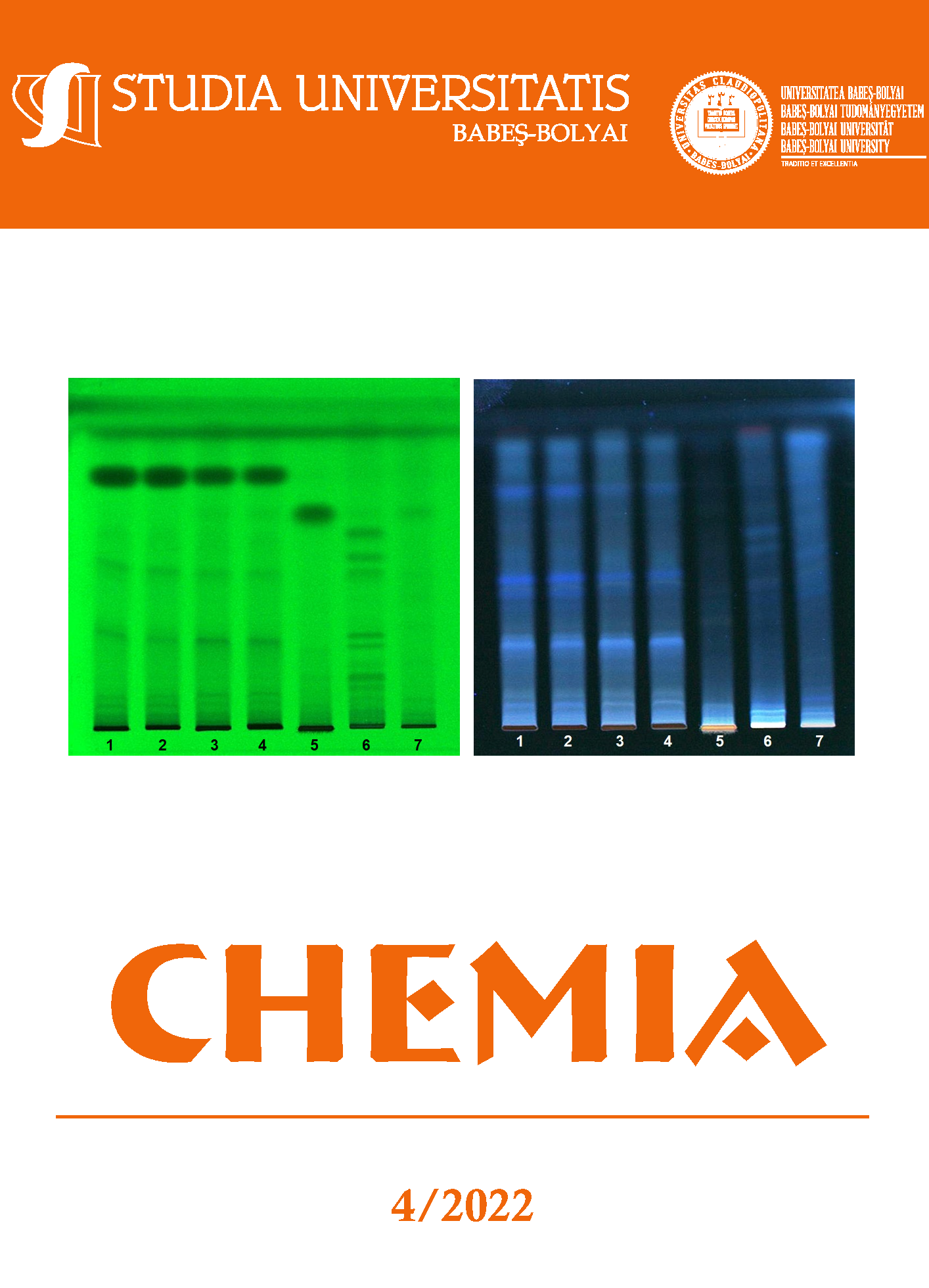HISTORICAL ASSESSMENT OF ATMOSPHERIC PERSISTENT ORGANIC POLUTANTS DEPOSITIONS IN MUNTINU GLACIAL LAKE, SOUTHERN ROMANIAN CARPATHIANS, BASED ON RADIONUCLIDE-DATED SEDIMENTS
DOI:
https://doi.org/10.24193/subbchem.2022.4.19Keywords:
Historical pollution, Polycyclic aromatic hydrocarbon, Organochlorine Pesticide, Polychlorinated biphenyl, radionuclides dated sediment.Abstract
This study aims to assess the pollution history of persistent organic pollutants (POP) in lake Muntinu, Carpathian Mountains, Romania. Gamma spectrometry was used to measure 210Pb and 137Cs radionuclides in order to determine the age of sediment layers. The target compounds were isolated from sediment samples by ultrasound-assisted extraction method, followed by purification of extracts using open-column chromatography. 16 polycyclic aromatic hydrocarbons (PAHs), 20 organochlorine pesticides (OCPs) and 12 polychlorinated biphenyls (PCBs) were analysed in each dated sediment layer using gas chromatography coupled with mass spectrometry or electron capture detector. The results show that, over the past 100 years, POP concentrations from sediment samples ranged from 2.53 to 156.27 ng/g for PAHs, from 1.78 to 71.12 ng/g for OCPs, and from not detected to 76.03 ng/g for PCBs. PAHs diagnostic ratios such as ƩLMW/ƩHMW, ANT/(ANT+PHE) and FLT/(FLT+PYR) show that the main source of PAHs in the sediment is of pyrogenic nature, especially from biomass and coal combustion. The sources of OCPs and PCBs could not be determined due to the lack of data obtained. However, the study demonstrates that the analysis of POP residues in sediments is a suitable method for reconstructing the history of surface water pollution.
References
United Nations Environmental Program, Stockholm Convention. http://chm.pops.int/TheConvention/ThePOPs/ListingofPOPs/tabid/2509/Default.aspx, Accessed on October 12, 2022.
G. Chen; Hexachlorocyclohexanes Including Lindane, In Encyclopedia of Toxicology, 3rd ed, P. Wexler, Elsevier, Amsterdam, 2014, pp. 874-876A.
A. M. Jackovitz; R. M. Herbert; Wildlife Toxicity Assessment for Hexachlorocyclohexane (HCH), In Wildlife Toxicity Assessments for Chemicals of Military Concern, M. Williams, G. Reddy, M. Quinn, M. Johnson, Elsevier, Amsterdam, 2015, Chapter 27, pp. 473-497.
H. J. Xu; J. Bai; W. Y. Li; L. X. Zhao; Y. T. Li; J. Hazard. Mater., 2019, 365, 622–631.
J. Kim; Q. Sun; Y. Yue; K. S. Yoon; K. Y. Whang; J. Marshall Clark; Y. Park; Pesticide Biochemistry and Physiology, 2016, 131, 40–45.
R. K. Gupta; R. A. Schuh; G. Fiskum; J. A. Flaws; Toxicol. Appl. Pharmacol., 2006, 216, 436–445.
Y. Zhang; Z. Dong; Z. Peng; J. Zhu; F. Zhuo; Y. Li, Z. Ma; Environ. Pollut., 2022, 309, 119725
Q. Wu; X. Du; X. Feng; H. Cheng; Y. Chen; C. Lu; M. Wu; H. Tong; Ecotoxicol. Environ. Saf., 2021, 225, 112739.
A. M. Dearth; R. A. Hites; Environ. Sci. Technol. 1991, 25, 245-254.
M. H. G. Berntssen; A. Maage; A. K. Lundebye; Contamination of finfish with persistent organic pollutants and metals, In Chemical Contaminants and Residues in Food, Schrenk. D., Woodhead Publishing Ltd: Cambridge, United Kingdom, 2012, pp. 498–534.
M. Honeycutt; L. Jones; Endrin, In Encyclopedia of Toxicology, 3rd ed.; P. Wexler, Academic Press, Elsevier, Amsterdam, 2014, 2014, pp. 344–347.
N. R. Reed, S. Koshlukova; Heptachlor, In Encyclopedia of Toxicology, 3rd ed.; P. Wexler, Academic Press, Elsevier, Amsterdam, 2014 , pp. 840–844.
A. S. Purnomo; T. Mori; S. R. Putra; R. Kondo; Int. Biodeterior. Biodegradation, 2013, 82, 40–44.
D. Megson; Polychlorinated Biphenyls, In Encyclopedia of Analytical Science, 3rd ed, P. Worsfold, A. Townshend, C. F. Poole, M. Miro; Elsevier, Amsterdam, 2019, pp. 318-328.
P. D. Boehm; Polycyclic Aromatic Hydrocarbons (PAHs), Environmental Forensic, 1st ed.; R. Morrison, B. Murphy, Elsevier, Amsterdam, 2005, pp. 313-337.
K. Kozak; M. Ruman; K. Kosek; G. Karasinski; Ł. Stachnik; Z. Polkowska; Water, 2017, 9, 42.
W. Zhang, S. Zhang, C. Wan, D. Yue, Y. Ye, X. Wang, Environ. Pollut., 2008, 153, 594-601.
A. N. Gachanga; Polycyclic Aromatic Hydrocarbons, In Encyclopedia of Analytical Science, 3nd ed., P. Worsfold, A. Townshend, C. F. Poole, Elsevier, Amsterdam, 2005, pp. 234-242.
P. Wang, Q. Zhang, Y. Wang, T. Wang, X. Li, L. Ding, G. Jiang, Anal. Chim. Acta, 2010, 663, 43–48.
W. Wang, B. Meng, X. Lu, Y. Liu, S. Tao, Anal. Chim. Acta, 2007, 602, 211–222.
B. Barhoumi, M. S. Beldean-Galea; A. M. Al-Rawabdeh; C. Roba; I. M. Martonos; R. Bălc; M. Kahlaoui; S. Touil; M. Tedetti; M. R. Driss; C. Baciu; Sci. Total Environ., 2019, 660, 660-676.
L. Zhu, Y. Chen, R. Zhou; J. Hazard. Mater., 2008, 150(2), 308-316.
R.C. Begy; S. Kelemen; H. Simon; C. Tănăselia; Geochronometria, 2018, 45, 97-106.
P.G. Appleby; Chronostratigraphic Techniques in Recent Sediments, in Tracking Environmental Change Using Lake Sediments, Smol, J.P. (eds). Developments in Paleoenvironmental Research, vol 1. Springer, Dordrecht, Netherlands, 2002, pp. 171-203.
R.C. Begy; C. F. Savin; S. Kelemen; D. Vereș; O. L. Munteanu; C. V. Maloș; T. Kovacs; PLoS One, 2021, 16(6), e0251603.
Downloads
Published
How to Cite
Issue
Section
License
Copyright (c) 2022 Studia Universitatis Babeș-Bolyai Chemia

This work is licensed under a Creative Commons Attribution-NonCommercial-NoDerivatives 4.0 International License.



